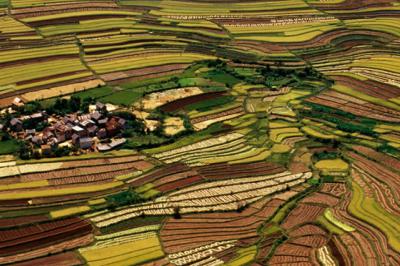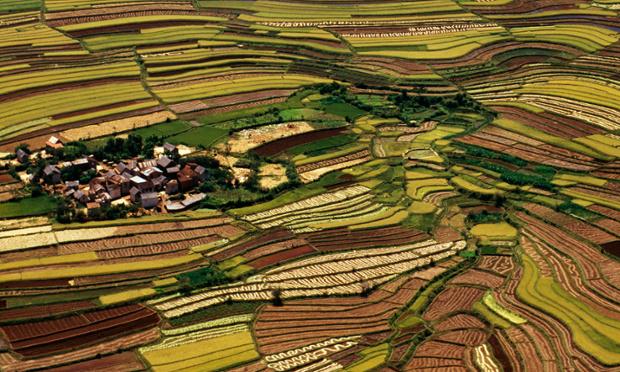 Photograph: Alamy
Photograph: AlamyReinvesting natural resource revenues into EBA-driven agriculture is imperative to leapfrog Africa into a world where, in the words of Nelson Mandela, there is work, bread, water and salt for all.
The 2014 Africa Progress Panel report presents the two faces of Africa: robust economic growth and continuing poverty. But the report suggests Africa could change this duality by asking: how can resources make a positive impact on development? While impressive headline growth figures are reported, incomes do not trickle down to improve livelihoods of the majority of the population.
Diversifying sources of growth, to include a strengthened agriculture sector that works with nature and not against it, will go a long way to improving livelihoods, considering that the sector currently employs about 60% of Africa’s labour force, most of it rural. Going forward, it’s imperative to look at whether relying on oil or soil could provide the most feasible pathway to enhance food security and job creation for the youth, currently at 200 million and rising to 400 million by 2040.
Oil: from curse to blessing
With 60% of Africa’s workforce directly dependent on agriculture for survival - and growing poverty and food insecurity according to the World Bank - it is where the food is grown that should be the focus. Africa’s soil should be its next “oil” in a changing climate.
The continent had a food import bill of over $35bn in 2011 (excluding fish) and imports of food exceed exports by 30%. In addition, growing urban populations and the middle class are demanding more nutritious, varied and processed food, creating opportunities for income generation from agriculture.
Going forward, African agriculture and agribusiness is estimated to be worth $1tn by 2030. Foreign Direct Investment (FDI) in African agriculture is projected to grow from less than $10bn in 2010 to more than $45bn in 2020. This demonstrates the potential of agriculture to generate significant income for Africa. In addition, considering that existing oil and mineral reserves will run out, but Africa’s soil and its ecosystems, including rivers and forests, will remain, agriculture offers a sustainable source of income. Oil revenue should be reinvested into agriculture to ensure food production and employment creation well into the future.
Farming must be sustainable, not industrial
Intensified conventional agriculture, that focuses on expanding production only, rather than ensuring the resilience of the entire food system, will have a negative impact on smallholders as well as the environment.
Conventional approaches such as deforestation and overuse of fertilisers to increase yield undermine the ecosystem that food production depends on. Less damaging approaches are necessary to safeguard future food security. Ecosystem-based adaptation (EBA) approaches offer an alternative. For example, maize rotated with soybean increases yields by 5–20% more than continuous maize monocultures. Rotating peas with wheat increases soil nitrogen levels by 6–14 kg/ha, and with this, an 8% increase in wheat yields.
Sustainable farming approaches are easily adaptable in most rural communities, since they involve traditional agricultural practices. A recent United Nations Environment Programme (UNEP) publication shows how it is possible to invest in EBA with case studies from eight African countries. Also work done by NGOs Futures Agriculture and Canadian Foodgrains Bank provide examples of EBA-driven agriculture in Africa.
The new frontier
Some regional-level practical action is already under way, as manifested by the Maputo and Malabo declarations, and should be applauded. At the national level, governments should incentivise private sector involvement in EBA-driven agriculture to bring in capital and enhance competitiveness. Key policy areas to consider are land tenure, asset ownership, tax incentives and special economic zones. In addition, as a longterm measure, governments should invest in educational programmes about the potential of EBA-driven agriculture.
Reinvesting natural resource revenues into EBA-driven agriculture is imperative to leapfrog Africa into a world where, in the words of Nelson Mandela, there is work, bread, water and salt for all.
Richard Munang is Africa regional climate change programme co-ordinator and Robert Mgendi is the Africa regional office ecosystem-based adaptation officer at the United Nations Environment Programme.








